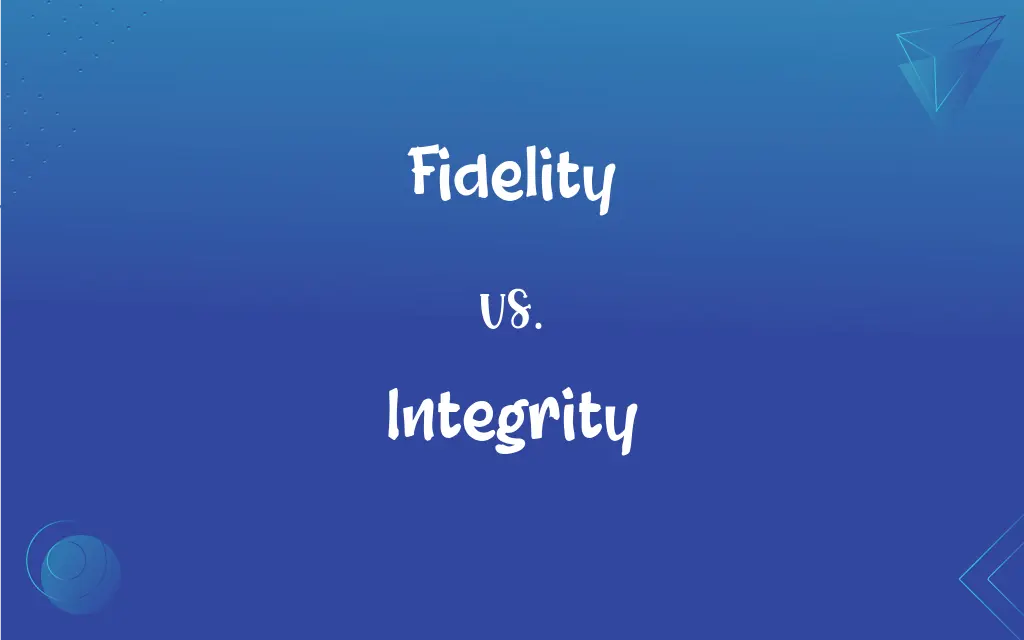Fidelity vs. Integrity: What's the Difference?
Edited by Janet White || By Harlon Moss || Published on August 15, 2024
Fidelity refers to faithfulness or loyalty, often in relationships or agreements, while integrity denotes adherence to moral and ethical principles.

Key Differences
Fidelity primarily refers to loyalty and faithfulness within specific contexts, such as in a relationship, to a cause, or to an agreement. Integrity encompasses a broader range of moral principles, including honesty, fairness, and incorruptibility, applicable in all aspects of life.
Fidelity often involves a commitment to another person or entity, implying loyalty and steadfastness to a partner, organization, or cause. Integrity, meanwhile, is an internal moral compass, guiding an individual's actions and decisions based on personal ethical values, regardless of external relationships.
Fidelity is evaluated based on adherence to the promises or vows made to others. It is often associated with trustworthiness in relationships. Integrity is assessed based on consistency in moral and ethical behavior, reflecting an individual's character and principles.
Acts of fidelity are seen in the context of honoring commitments, such as marital faithfulness or loyalty to an employer. Integrity is demonstrated through actions that are consistent with ethical and moral standards, even when no explicit commitment is involved.
Fidelity contributes to the stability and trust within specific relationships or institutions. Integrity, on a broader scale, is fundamental to the fabric of societal trust and ethical conduct, influencing interactions and decisions in both personal and public realms.
ADVERTISEMENT
Comparison Chart
Definition
Faithfulness to specific commitments or duties
Adherence to moral and ethical principles
Context
Relational, specific agreements or relationships
Personal, applicable in all aspects of life
Key Quality
Loyalty and steadfastness
Honesty and moral consistency
Evaluation
Based on adherence to vows or promises
Based on consistent ethical behavior
Societal Role
Enhances trust in specific contexts
Fundamental to overall societal ethics
ADVERTISEMENT
Fidelity and Integrity Definitions
Fidelity
Adherence to promises or duties.
Her fidelity to her work commitments was admirable.
Integrity
Honesty and adherence to moral principles.
His integrity was evident in all his business dealings.
Fidelity
Accuracy in reproducing sound or images.
The speaker's high fidelity produced crystal clear audio.
Integrity
Moral uprightness and honorable character.
His integrity set a standard for others to follow.
Fidelity
Faithfulness to an original or a standard.
The film adaptation maintained fidelity to the book.
Integrity
Consistency in ethical actions and values.
She was known for her integrity in her personal and professional life.
Fidelity
Exactness in details or reproduction.
The artist's work was praised for its fidelity to nature.
Integrity
Soundness of moral character.
Her integrity was respected by everyone in the community.
Fidelity
Loyalty to a spouse or partner.
Their marriage was a testament to their fidelity.
Integrity
The quality of being whole and undivided.
The integrity of the structure was essential for safety.
Fidelity
Faithfulness to obligations, duties, or observances.
Integrity
Steadfast adherence to a strict moral or ethical code
A leader of great integrity.
Integrity
The state of being unimpaired; soundness
The building's integrity remained intact following the mild earthquake.
FAQs
What is fidelity?
Fidelity is the quality of being faithful to commitments or obligations.
What does integrity mean?
Integrity refers to adherence to moral and ethical principles.
Can fidelity exist in platonic relationships?
Absolutely, it applies to any form of committed relationship.
How is fidelity demonstrated?
Through loyalty and faithfulness to a person, cause, or agreement.
Can you have fidelity without integrity?
Yes, one can be faithful to a commitment even without high moral principles.
Does fidelity apply to professional relationships?
Yes, it includes loyalty to employers or organizations.
Is fidelity a legal obligation?
In some cases, like contracts or marriage, it can be.
Does integrity affect leadership?
Yes, leaders with integrity inspire trust and respect.
Why is integrity important?
It builds trust and respect, and guides moral decision-making.
What undermines integrity?
Dishonesty, unethical behavior, and inconsistency in values.
What's the role of fidelity in trust?
It's essential; fidelity builds and maintains trust in relationships.
Can integrity change over time?
Yes, it can evolve with personal growth and experience.
What are examples of integrity in the workplace?
Fair dealings, honesty, and ethical business practices.
How does one show integrity in daily life?
By consistently making honest and ethical choices.
Can fidelity be regained once broken?
It's challenging but possible with effort and rebuilding trust.
Is integrity inherent or learned?
It can be inherent but is often developed and nurtured over time.
How does society benefit from fidelity?
It strengthens the bonds and trust within communities and institutions.
Is fidelity only relevant in romantic relationships?
No, it's relevant in any committed relationship.
How is integrity measured?
Through consistency in ethical behavior and choices.
What's the impact of integrity on society?
It upholds moral standards and fosters a trustworthy, ethical community.
About Author
Written by
Harlon MossHarlon is a seasoned quality moderator and accomplished content writer for Difference Wiki. An alumnus of the prestigious University of California, he earned his degree in Computer Science. Leveraging his academic background, Harlon brings a meticulous and informed perspective to his work, ensuring content accuracy and excellence.
Edited by
Janet WhiteJanet White has been an esteemed writer and blogger for Difference Wiki. Holding a Master's degree in Science and Medical Journalism from the prestigious Boston University, she has consistently demonstrated her expertise and passion for her field. When she's not immersed in her work, Janet relishes her time exercising, delving into a good book, and cherishing moments with friends and family.






































































